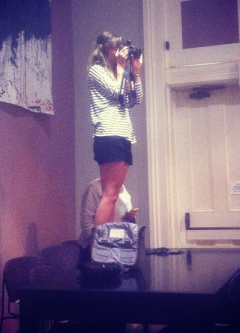Grad Student Guest Post: Sophie Hay on Answering the Career Question

As the school year comes to a close, a grad student guest post from first year Southern Studies M.A. student Sophie Hay.
“But, what do you want to do after your M.A. degree?” – The heart-sinking question so many grad students dread. As liberal arts students, we are repeatedly assured by faculty that our degrees can take us “anywhere” and that “all career doors are open” to us. However, that doesn’t make it any easier for us to decide what vocations to pursue. Unless pursuing a PhD, most graduate students don’t know the precise route they’ll take after their formal studies conclude. However, we’re continually exposed to experiences that help us understand our strengths and develop our interests. Although the “dreaded question” used to fill me with anxiety and induce nervous ramblings about impulsively-invented plans, I am gradually becoming more confident about my future. Why? Because, the Southern Studies M.A. program is equipping me with experiences and skills that I feel will help me navigate the scary world of employment. Here’s how.
Academic Work
Graduate studies is extremely challenging and the workload for a Southern Studies M.A. student is intensive. Reading assignments push us to engage with often labyrinthine scholarship, cultivating strong analytical skills. Writing assignments demand the development of keen research skills and the ability to present a cogent argument. Graduate students are trained to become independent and original thinkers.
Internships
The Center for the Study of Southern Culture helps pair graduate students with a variety of estimable cultural organizations. While I am yet to intern, I look forward to applying for one next semester. Kayla Marion, a first year Southern Studies grad student, is currently enjoying an intern position with Living Blues magazine. These internships offer valuable work experience and, especially given their competitive nature, look impressive on resumes!
Community Service and Field Work
Southern Studies classes encourage graduate students to engage in academic work outside of the classroom, as well as in it. Dr. Wharton’s Documentary and Oral History class challenges students to engage in documentarian-style field work, conducting interviews with members of the community. Dr. Skipper’s Special Topics class invites students to volunteer at the Behind the Big House Project in Holly Springs, MS, acting as docents to visitors touring the historic slave dwellings. These classes offer graduate students the opportunity to grow in confidence and to strengthen communication skills, assets valued by any employer.
Assistantships
A variety of competitive assistantships are on offer to graduate students, giving financial support to students working with Southern Studies staff/faculty. A Graduate Assistant can take on a variety of roles and will learn valuable skills from their assistantship director. First year graduate assistant Irene Van Riper is currently working as a teaching assistant in the Southern Studies 102 class led by Dr. Katie McKee and Dr. Catarina Passidomo. I am enjoying working with Becca Walton, offering assistance at Southern Studies events, acting as photographer at weekly Brown Bag lectures, and writing blog posts (like this one) for the Southern Studies website.
Conferences and Symposia
The Center for the Study of Southern Culture plays host to a number of important events throughout the academic year. Last fall, for example, the SFA hosted the Southern Foodways Symposium which flooded Oxford with celebrated academics and thinkers, including Marcie Cohen Ferris and Ta-Nahesi Coates. Many of these events allow graduate students to participate in panels and, all importantly, to network with an array of notable scholars.
Ultimately, these various opportunities ensure that we will leave the Southern Studies M.A. program with skill sets to support us in whatever career paths we (eventually!) choose to pursue.
